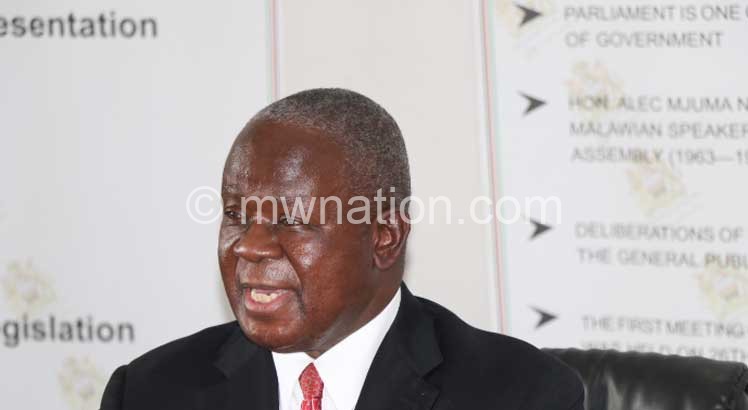Mlusu concedes Subsidy pressure
Minister of Finance Felix Mlusu says Treasury is working on an exit strategy model for the Tonse Alliance administration’s flagship Affordable Inputs Programme (AIP), saying the initiative is not sustainable in the long-term.
The minister, speaking during an Economics Association of Malawi (Ecama) membership and private sector post-budget meeting over dinner on Friday in Blantyre, said considering that the AIP was derived from an election campaign promise, government could not just scrap it.
He said Treasury has been reducing its expenditure line to reduce pressure on the fiscus.
Mlusu s a i d : “As government, we believe that AIP cannot go on forever. We must find a way of exiting at some point.
“Obviously, this was a campaign promise we made. We have done this in one year. Obviously, it cannot make sense for us to scrap it come the second year.

“Last year, we budgeted for K160 billion, but we trimmed it to K142 billion. That was one way of reducing the pressure that the AIP is bringing on the fiscus.”
The minister added that government is developing a workable model that will see Malawians benefitting while at the same time ensuring that Treasury is not overstretched in terms of funding.
Mlusu said: “But as we work on the exit strategy, it’s not a question of us just to scrap it. We should find something that should replace the programme that will be sustainable.
“As economists, you are better-placed to help us with the exit strategy. Our experts are looking at how to manage thus, including a chat with other countries who have been giving subsidies to their people.”
In the proposed K1.9 trillion 2021/22 National Budget, the agriculture sector has been allocated K284.4 billion, which is 14.3 percent of the total budget.
However, in line with first pillar of Malawi 2063 which is agriculture productivity and commercialisation, K142 billion has been allocated to the AIP to benefit at least 3.5 million farming households.
The AIP allocation, which has taken up 50 percent of the national agriculture budget, is part of the total allocation to the agriculture sector.
On her part, Ecama president Lauryn Nyasulu said while the AIP is a good social programme, the association is concerned with its sustainability. She proposed the need for a graduation strategy.
She said allocating the same resources to infrastructure development, for instance, could have more multiplier effects for the economy than the AIP.
Nyasulu said: “There is need for a clear exit strategy on how we are going to get out of this.”
AIP was rolled out as a successor to the Farm Input Subsidy Programme (Fisp) implemented by the previous Democratic Progressive Party (DPP) administration since 2006.
Unlike Fisp, which targeted an average one million beneficiaries at a cost of about K35 billion per year, AIP is ambitious by targeting four times the number. It also uses the national identity cards.
By February 20 when the programme officially closed, 3.4 million farmers had redeemed their inputs against the total targeted number of 3.7 million beneficiaries.
In terms of beneficiaries and expenditure , government spent K140.2 billion on AIP from the initial K160.2 billion allocation in the K2.2 trillion 2020/21 National Budget.
The reduction in the cost followed the flushing out of ghost beneficiaries from the initial 4.2 million down to 3.7 million farming households.
With AIP, government is expected to spend about K37 000 to subsidise each farmer accessing inputs under the programme. Each farmer will have to pay K4 495 per bag of fertiliser accessed and K2 000 for a pack of cereal seed of choice.
Every smallholder farming household is entitled to a 50 kilogramme (kg) bag of NPK; a 50 kg bag of Urea; either 5kg of maize seed or 7kg of sorghum or 7kg of rice seed, depending on the farmer’s preference.
In December 2020, the World Bank, in the 12th edition of its biannual publication on Malawi, the Malawi Economic Monitor (MEM) faulted the AIP programme, saying the huge monetary costs “make it impossible” for government to sustain the scheme amid limited resources.
The report said this is despite the AIP having made two important positive aspects, notably the use of an electronic system and the engagement of the private sector in marketing activities.
Said the World Bank in the report: “This crowds-out potentially valuable investments in the sector which could promote diversification and more sustainable farming practices.”
The World Bank also proposed reforms in AIP, including a reduction in the share of the subsidy, fixing the subsidy level to reduce the fiscal risk and also rethinking the objective of the programme as well as the targeting. It notes that the bottom ultra-poor are unable to take advantage of subsidies and would be better off being linked to social safety nets such as social cash transfers.
Two months earlier, the International Monetary Fund also raised concerns over the narrow focus of the initiative on maize as opposed to Fisp.





